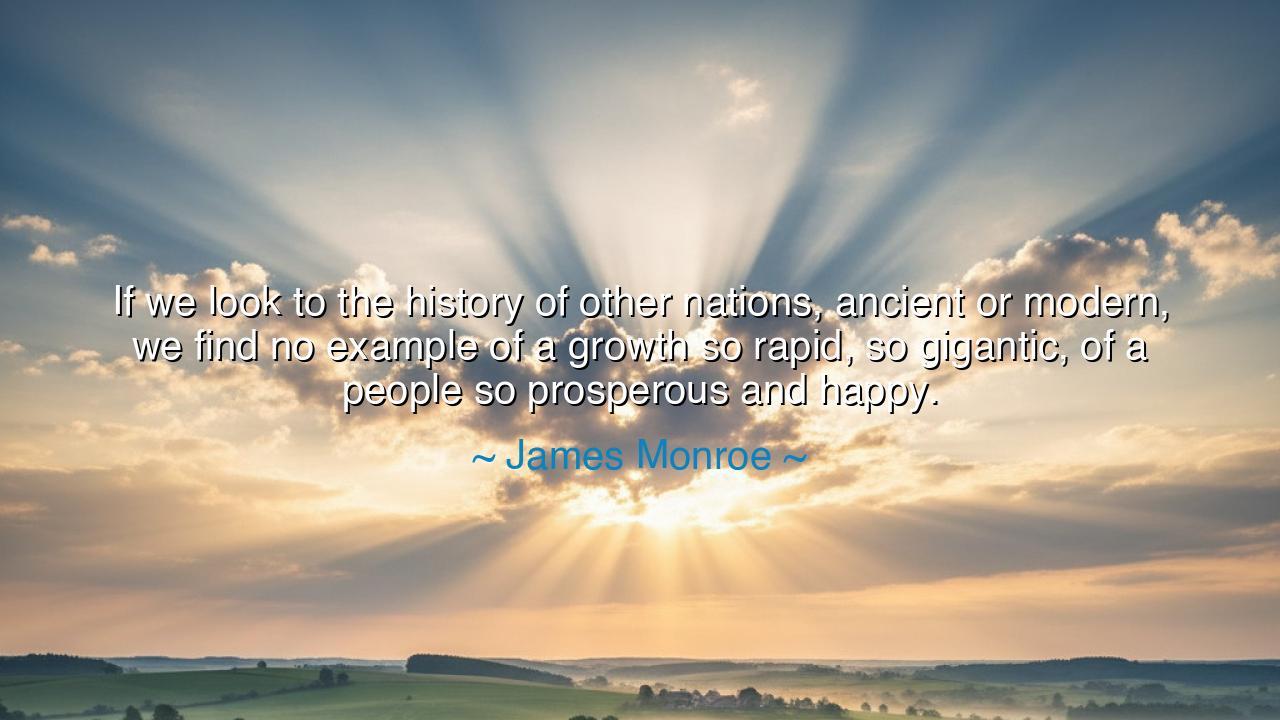
If we look to the history of other nations, ancient or modern, we
If we look to the history of other nations, ancient or modern, we find no example of a growth so rapid, so gigantic, of a people so prosperous and happy.






When James Monroe, the fifth President of the United States, spoke the words, “If we look to the history of other nations, ancient or modern, we find no example of a growth so rapid, so gigantic, of a people so prosperous and happy,” he stood at the dawn of a new age — an age where a young nation, barely free from the shackles of colonial rule, had already begun to stretch its limbs across a vast continent. His words were not merely those of pride but of wonder — the awe of a man witnessing the unfolding of destiny. He saw in America’s rise something almost divine: a growth not only of territory, but of spirit, unity, and purpose. His was a voice filled with gratitude and forewarning, for rapid growth is both a blessing and a test.
In those years following revolution, the United States was still tender in its youth, yet fierce in its ambition. Other empires — Rome, Persia, Egypt — had taken centuries to gather their strength. But this new republic, forged in liberty’s fire, was rising with unnatural speed. Monroe looked upon his nation and saw cities blooming, commerce flowing, institutions forming, and a people more confident with each passing year. To him, it was as if Providence itself had breathed upon the land. This was the age that would later give birth to the Monroe Doctrine, his famous declaration that the New World would remain free from the old world’s entanglements — an assertion not of arrogance, but of guardianship over the spirit of self-determination.
Monroe’s admiration for this rapid growth and prosperity was not blind. Like the ancients, he understood that fortune is a fickle companion. The same flames that kindle greatness can consume it. The empires of old had once believed themselves eternal — Athens, proud in philosophy, Rome, mighty in law, and Carthage, rich in trade — yet each in time fell, not to weakness of arms, but to decay of virtue. Monroe’s words thus carried an unspoken reminder: prosperity must be guarded by wisdom, and happiness must be rooted in justice. Without these, even the grandest of nations will wither.
History, too, offers examples that echo his insight. Consider the meteoric rise of Napoleon’s France, where, in the span of a single decade, the ambitions of one man transformed the continent. Yet that glory, built on conquest rather than compassion, burned too brightly and too briefly. The empire that promised order and greatness instead delivered ruin and exhaustion. Monroe, observing such turmoil from across the ocean, saw in his own nation a different promise — one not built upon domination, but upon the ideals of freedom, self-governance, and unity. His pride was not in might, but in moral growth — the emergence of a people learning to rule themselves with courage and faith.
In his heart, Monroe was not celebrating mere wealth or expansion, but the human spirit’s triumph over despair and division. He spoke as one who had lived through revolution, war, and uncertainty, and had seen a scattered people forge a single identity. In those days, America was still a fragile experiment — a republic daring to prove that men could be both free and ordered, both ambitious and virtuous. To witness that experiment succeed beyond all measure filled Monroe’s soul with reverence. His quote is not just praise; it is an invocation — a reminder that greatness must always be matched by gratitude.
And yet, beneath his admiration lay a question meant for the ages: Can any nation, however prosperous, remain happy if it forgets the principles that gave it birth? This is the deeper wisdom hidden in Monroe’s words. He invites future generations to look back upon history — to see that speed without direction, growth without conscience, and prosperity without virtue lead only to decline. The ancients called it hubris, the pride that blinds the heart of nations. Monroe, in his statesman’s wisdom, calls us instead to balance: to honor progress, but temper it with humility; to celebrate freedom, but guard it with discipline.
So, let his voice echo through time as a lesson to all peoples who rise swiftly: A nation’s greatness is not measured by its size or its speed, but by the steadiness of its spirit. Let us learn from the ancients and from Monroe alike — that prosperity must serve purpose, that happiness must rest upon justice, and that progress without wisdom is but a gilded ruin. If we build with care, with truth, and with compassion, then our own growth, too, may be called “rapid, gigantic, and prosperous” — not in wealth alone, but in the enduring strength of the human soul.






AAdministratorAdministrator
Welcome, honored guests. Please leave a comment, we will respond soon